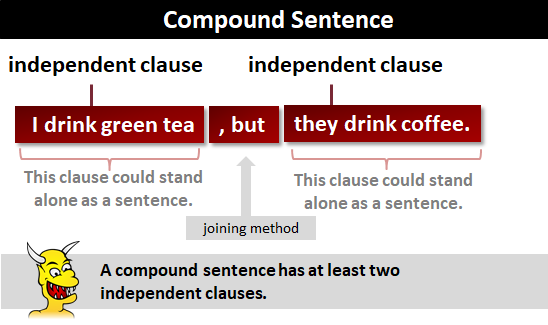According to the classification of sentences as to meaning or function, every sentence is either declarative, imperative, interrogative or exclamatory.
THE DECLARATIVE SENTENCE
A declarative sentence is a sentence that makes a statement (affirmative or negative):
The small wagon is overloaded.
He was not very optimistic about the elections.
THE IMPERATIVE SENTENCE
An imperative sentence is a sentence that voices a command or entreaty:
Do nothing about it.
Don´t overload the wagon.
THE INTERROGATIVE SENTENCE
An interrogative sentence is a sentence that asks a question:
Have you finished your work?
What are you going to do about it?
THE EXCLAMATORY SENTENCE
An exclamatory sentence is a sentence that voices an exclamation, cry, or expression of strong feeling:
How silly!
They have done it!
According to their structure,sentences are classified into four different types: simple sentence, compound sentence, complex sentence and compound- complex sentence.
THE SIMPLE SENTENCE
The simple sentence consists of a single independent clause.
A simple sentence is not always a short, basic sentence , it could have a compound subject (i.e., a subject with two or more heads). For example:
Jack and Jill like walking.(This is a simple sentence with a compound subject made up of two heads ("Jack" and "Jill").)

The compound sentence consists of two or more independent clauses.
An independent clause (unlike a dependent clause) can stand alone as a sentence.
Joining the Independent Clauses in a Compound Sentence
In a compound sentence, the independent clauses are joined using one of the following methods:
- A coordinating conjunction with a comma (e.g., ", and")
- I like tea, and he likes coffee.
- A semicolon
- I like hot chocolate; it sends me to sleep.
- A colon
- I know one thing: I love that girl. (This is rare because the words after a colon are not often an independent clause.)
- A dash
- I know you're here — I can smell your perfume.
- A conjunction with a semicolon (e.g., "; and")
- After the lights went out, I could hear you whispering; and I know you were talking about me. (This is rare because it's an outdated style.)
Here is a short video explaining what we mean by compound sentence.
THE COMPLEX SENTENCE.
The complex sentence has one independent clause and at least one dependent clause.

Examples of Complex Sentences
Stay in the bath until the phone rings.
Both the cockroach and the bird would get along very well without us, although the cockroach would miss us most. (Joseph Wood Krutch, 1893-1970)
Leave while you can.
Subordinating Conjunctions in Complex Sentences
In these examples of complex sentences, the subordinating conjunctions are shown in bold.
We can never obtain peace in the outer world until we make peace with ourselves. (Dalai Lama)
Even though he's a moron, I supported Tyson Fury. (Boxer David Haye)
Here is a short video explaining what we mean by complex sentence.
- I stopped believing in Santa Claus when he asked for my autograph in a department store, but I still want to believe in him.







No hay comentarios.:
Publicar un comentario